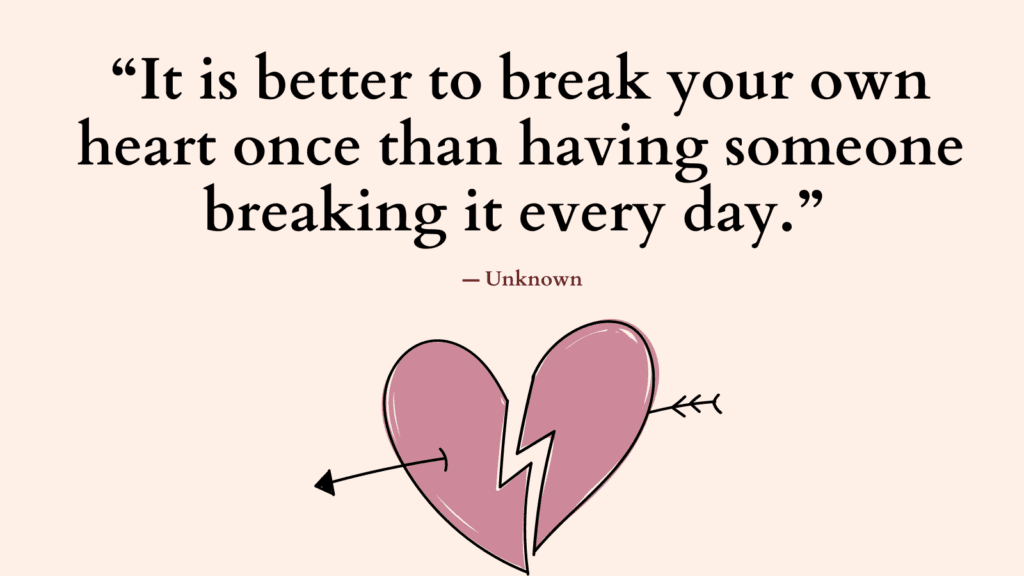Today, you’re going to learn about the stages of betrayal trauma and tips for overcoming it.
What Is Betrayal Trauma?
Betrayal trauma was first introduced in 1991 by psychologist Jennifer Freyd.
She described it as a specific trauma that happens in key relationships (between a parent and child or between romantic partners) where the betrayed needs to maintain the relationship with the betrayer for support (physical or emotional) or protection.
The betrayal often goes unacknowledged or addressed because the person who has been betrayed fear that acknowledging the betrayal could lead to abandonment.
Related: Betrayal Trauma Test: Do I Have Betrayal Trauma?
Signs and Symptoms of Betrayal Trauma
Symptoms of betrayal trauma are similar to those of PTSD.
Keep in mind that everyone will experience trauma differently.
The DSM-5 divides PTSD symptoms into four categories:
1. Intrusion (at least one of the following)
- Unwanted upsetting memories
- Nightmares
- Flashbacks
- Emotional distress after exposure to traumatic reminders
- Physical reactivity after exposure to traumatic reminders
2. Avoidance of: (at least one of the following)
- Trauma-related thoughts or feelings
- Trauma-related external reminders
3. Negative changes in thoughts and mood (at least two of the following)
- Inability to recall key features of the trauma
- Overly negative thoughts and assumptions about oneself or the world
- Exaggerated blame of self or others for causing the trauma
- Negative affect
- Decreased interest in activities
- Feeling isolated
- Difficulty experiencing positive affect
4. Changes in arousal and reactivity (at least two of the following)
- Irritability or aggression
- Risky or destructive behavior
- Hypervigilance
- Heightened startle reaction
- Difficulty concentrating
- Difficulty sleeping
Children who experience betrayal may also experience dissociation or detachment from reality as a coping mechanism to avoid memories of the abuse.
Related: How To Start A Self Love Journey? Top 10 Powerful Ways to Love Yourself More
Infidelity Trauma
Betrayal in a romantic relationship often takes the form of infidelity.
If you’ve been cheated on, you may experience some of the following:
- Numbness
- Anger
- Guilt and self-blame
- Loss of self-esteem and sense of self-worth
- Intrusive thoughts about the affair
- Loss of trust in others
- Suspicion and hypervigilance
- Anxiety, depression, or other mental healthy symptoms
- Physical symptoms, such as pain, muscle tension, upset stomach, insomnia, difficulty concentrating, rapid heartbeat, etc.
Related: How To Repair A Marriage After Infidelity? Best 8-Step Guide to Build Trust Again
Ways Betrayal Trauma Alters The Mind And Body
Neuroscience has revealed that emotional pain is just as real to the brain as physical pain (McDonald and Leary 2005).
Betrayal trauma can have a severe impact on the person and cause them to experience symptoms such as:
- Emotional dysregulation
- Depression
- Anxiety
- PTSD
- Dissociation
- Difficulty concentrating
- Trust and relationship issues
- Physical pain and gastrointestinal issues
Related: Betrayal Blindness – What Is It & How To Overcome It?
Betrayal Trauma Triggers
Almost anything can trigger memories of the betrayal and unleash overwhelming emotions in reaction.
Triggers may include: people involved, certain places, certain times of year, e-mails, unexpected messages and phone calls, scenes in a movie
Triggers can also generalize to any negative feeling you experience for any reason.
Related: Best 55 Betrayal Trauma Quotes That Will Make You Feel Less Alone
7 Stages of Betrayal Trauma
The following are stages of betrayal trauma – in no particular order – that you may encounter as you process your emotions.
1. Shock and Disbelief
Whether the revelation of the betrayal was (1) sudden (by confession, eyewitness account, phone messages, e-emails, etc.) or (2) gradual (e.g. realizing what your life has become after years of abuse), the shock can be devastating.
Knowledge of betrayal is always destabilizing.
Betrayal is likely to provoke actions that disturb the status quo and threaten our security.
It’s only natural for you to remain in disbelief. You may feel like you’re in a dream and that when you’ll wake up, everything will be fine.
This stage can last for a few days, weeks, or even months, depending on the severity of the betrayal.
2. Denial
During this stage, the betrayed will try to deny that the betrayal didn’t happen.
You may try to justify, make excuses, rationalize or simply ignore what happened completely.
Often, the betrayer will try to invalidate and gaslight the person betrayed into believing that the betrayal didn’t happen.
Related: How To Step Out Of Denial? Top 10 Steps To Overcome Denial When The Truth Is Heartbreaking
3. Obsession
During this stage, the betrayed becomes obsessed and fixated on the betrayal.
You might spend most of your days wrestling with intrusive thoughts about details of the betrayal, trying to figure out what went wrong, how you might have caused, or why you didn’t see it coming.
This stage can be extremely troubling and can affect daily functioning.
4. Anger
Shock, disbelief and obsession often give way to intense feelings of anger.
In the face of uncertainty and powerlessness you’re left with, anger temporarily numbs pain and provide a surge of energy to lessen the pain of feelings of powerlessness and vulnerability.
Of course, the empowering effects are short-lived. The surge of energy ends abruptly and causes you to drop you down lower than the point at which they picked you up.
You become depressed or numb.
5. Bargaining
Although the surge of energy has dropped, you’re not ready to give in to the pain yet.
During this stage, the betrayed is holding onto hope that things can be fixed and go back to normal (what’s familiar).
The betrayer may also make promises to change and ask for another chance.
6. Depression and Grief
This is when the betrayed sinks into deep sadness and despair.
You may feel a sense of heaviness that you carry with you everywhere you go, lack of interest in things you used to enjoy, feelings of hopelessness, etc.
This is time for facing what happened and grieving everything you lost because of the betrayal.
Related: What is Concealed Depression? (Effective 3-Step Guide To Overcome High Functioning Depression)
7. Acceptance and Healing
During this stage, the betrayed finally comes to terms with what happened.
Acceptance here doesn’t mean linking what happened or that you’re happy about it.
Acceptance means that you acknowledge what happened, without trying to deny or fight the fact that it did happen.
This feeling of acceptance can be very liberating. Now you have the energy and time to redirect toward your healing.
Note:
Keep in mind that healing isn’t linear.
Although you may have felt accepting, you may find yourself thinking of the betrayal and getting angry, which increases your energy and then drops you down to depression or blank numbness.
You may find yourself repeating this cycle not because you like thinking about the betrayal, but because thinking about it feels better than pain, depression, or numbness.
Related: The Difference Between Pain And Suffering (+Top 4 Tips On How To Embrace Pain & Stop Suffering)
7 Tips On How To Find Peace After Betrayal
The route to overcoming betrayal trauma won’t look the same for everyone, but the following strategies can support your healing journey:
#1. Acknowledge Your Pain
If you’ve been betrayed in a romantic relationship, you may experience trust issues and feelings of self-doubt.
If you choose to give your partner a second chance, it might take a long time (months and even years) before you can feel safe enough to trust them again.
Avoiding and suppressing happened may cause your pain to spill over to other areas of your life. You may start having intrusive thoughts about the affair (or any other symptom) that disrupt your daily functioning.
Note: If your betrayal trauma is caused by childhood trauma, it can overwhelming to bring up those memories again and revisiting them. So consider using the help of a mental health professional.
#2. Let Go of Self-Blame
Betrayal trauma can leave you with feelings of self-doubt and self-criticism.
You struggle with intrusive thoughts of self-doubt.
Was I attractive enough, smart enough, successful enough, interesting enough, present, caring, or sacrificing enough?
Keep in mind that being cheated on or betrayed is never your fault, no matter what underlying relationship issues have caused the betrayal.
Related: Top 10 Common Examples of Cognitive Distortions – How To Challenge Them (+Worksheets PDF)
#3. Recognize Self-Defense Mechanisms That Block Your Healing
It’s common to be left with feelings of shame, hurt, and humiliation after being betrayed.
These are painful feelings that you may try to avoid by remaining in denial or being stuck in anger and resentment.
According to Elizabeth Kubler-Ross’ ground-breaking work, On Death and Dying, “Denial functions as a buffer after unexpected, shocking news and allows the patient to collect himself, and with time, mobilize other, less radical defenses.”
The same could be said about anger.
Studies have identified anger as being a secondary emotion.
A secondary emotion is an emotion fueled by other primary emotions. For example, one of the primary emotions, like fear or sadness, can be found underneath the anger.
It’s easier to feel anger than feel hurt.
Related: Top 14 CBT Exercise For Anger Management (+FREE Anger Worksheets)
#4. Sit With Difficult Emotions
The only way out is through.
Allow yourself to feel painful primary emotions.
This can be done by reflecting on these emotions in a nonjudgmental way.
Ask yourself questions like,
- What emotion am I feeling?
- Where am I feeling it in my body?
- Why am I feeling this way?
- What do I need right now?
Sit with those feelings as you talk about them or write them down and offer yourself compassion.
Use the following worksheets to better identify your emotions: List of Bodily Sensations (Download PDF) and List of Emotions (Download PDF)
Related: How To Sit With Painful Emotions? (Top 9 Difficult Emotions)
#5. Turn To Others For Support
This can be a difficult step to take if you’re having a hard time trusting others after being betrayed.
However, emotional support a great resource to overcome betrayal trauma.
Pro Tip: Get the support you need whenever and wherever you want with 7Cupsoftea. It’s an on-demand emotional health service that connects you to caring listeners for FREE.
#6. Focus On Your Needs
Don’t feel pressured to decide right away whether to give a second chance to the person who betrayed your trust.
Instead, focus on your needs.
Take the time to get back in touch with yourself and take care of your physical and mental health.
Related: Top 45 Self Care Day Ideas at Home To Kickstart Your Self Care Ritual
#7. Address Underlying Issues
While betrayal is never a healthy response to relationship issues, addressing those issues (e.g. lack of communication, intimacy issues, etc.) can help build trust again and strengthen the relationship.
If you choose to work on the relationship, couples therapy can help you address relationship issues, but it’s also important to use the help of individual to address any distressing feelings you may be struggling with.
Individual therapy may also be essential for your partner to learn how to cope with problems in healthier ways.
Conclusion
The destructive force of betrayal comes from its violation of the implicit promise that gave us the courage to be vulnerable and love in the first place.
If you have felt betrayed, you know all too well betrayal strike at the core of your capacity to trust and love.
Unaddressed, this harsh and lingering pain almost invariably overflows into other areas of life.
FAQ
Can Betrayal Cause Trauma?
Yes, betrayal can cause trauma.
Betrayal involves a violation of trust, which can lead to feelings of shock, anger, sadness, and loss.
When someone experiences betrayal repeatedly or in a significant way, it can lead to post-traumatic stress disorder (PTSD), which is characterized by symptoms such as flashbacks, nightmares, avoidance behavior, and emotional numbness.
Additionally, the experience of betrayal can affect one’s ability to trust others and create a sense of safety and security in relationships.
How Long Does Betrayal Trauma Last?
The duration of betrayal trauma varies from person to person and the severity and frequency of the betrayal.
It can last for months or even years, especially if it occurs in the context of an ongoing relationship or if the betrayed person has difficulty processing their emotions or seeking support.
It’s important for individuals experiencing betrayal trauma to seek professional help, engage in self-care practices, and surround themselves with supportive people in order to facilitate healing and recovery.
References
- Portions of this article were adapted from the book Diagnostic and Statistical Manual of Mental Disorders, Fifth Edition, Text Revision (DSM-5-TR), © 2021 by American Psychiatric Association. All rights reserved.
- Portions of this article were adapted from the book Living and Loving After Betrayal, © 2013 by Steven Stosny. All rights reserved.
- Betrayal trauma – Wikipedia
- Betrayal Trauma: Signs, Recovery & Getting Help (choosingtherapy.com)
- Betrayal Trauma: Signs and How to Start Healing (healthline.com)
- Betrayal Trauma – an overview | ScienceDirect Topics
- Definition of Betrayal Trauma Theory (uoregon.edu)
- (PDF) The Impact of Betrayal Trauma on the Tendency to Trust (researchgate.net)
- Betrayal trauma: relationship to physical health, psychological distress, and a written disclosure intervention – PubMed (nih.gov)



